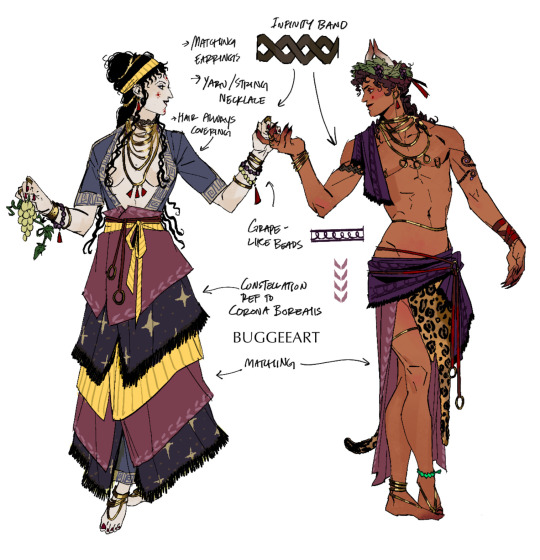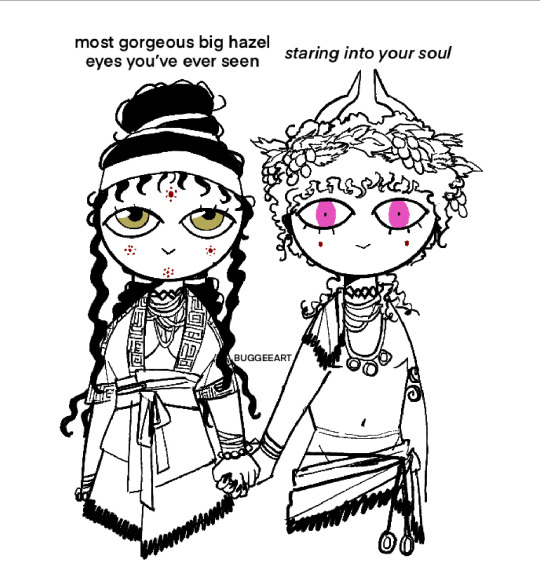undertheirinfluence
223 posts
20 | they/them | new to hellenic polytheism
Last active 60 minutes ago
Don't wanna be here? Send us removal request.
Text
I found some cicadas in my yard this morning, going at it . They fell off my grape vines, & my dogs noticed so I dove in there to save them . & I felt nervously like Tiresias ! Poking at them to get on this stick I'd found ! But they eventually climed on, & I found a safer place for them. & thankfully I have not been cursed ! Hera knows I meant no harm !
Picture under the cut btw

1 note
·
View note
Text

hydrangea, balloon flower, greek oregano, and lavender for lady ariadne & lord dionysos on the altar 🍇👑
(featuring my herakles&artemis plate, hephaistos "plate", and aphrodite bowl, plus some of my olympos bowl)
8 notes
·
View notes
Text
My Apollo altar!

Apollo was the first god I started praying to, and thus this was the first altar I made. I'm still so happy with it and I'm sure Apollo is too <3
192 notes
·
View notes
Text
If you have a professional relationship with you Deities, that's awesome!
If you have a therapeutic relationship with your Deities, that's awesome!
If you have an intimate relationship with your Deities, that's awesome!
If you have a romantic relationship with your Deities, that's awesome!
If you have a parental relationship with your Deities, that's awesome!
If you have a friendship with your Deities, that's awesome!
No matter what kind of Deity relationships you have, they are valid. Just because your experience differs from others does not make it any less valuable or real. Your relationships are wonderful, no matter the type. You do not deserve hate for them, and I'm truly, deeply sorry if you've ever experienced that. ❤️🫂
395 notes
·
View notes
Text
“oh it’s storming bad! Zeus and Hera must be fighting aga—” WRONG! they are FUCKING, narsty style!
223 notes
·
View notes
Text
When studying ancient texts, it's important to leave the protestant Biblical approach at the door! I see so many people who are tempted to treat the Illiad, Platonic dialogues, or the Hermetica in the same way a Christian would treat a Biblical passage.
The claims and teachings of these texts do not hinge on the events and characters in them being historically true, and in some cases not even on being written by the author they're attributed to.
For example, there are certain texts in the Platonic corpus that most scholars nowadays believe weren't written by Plato, but the teachings presented in them fit very well with the rest of the Platonic writings and are thus still used because they cover certain topics and areas that weren't covered in the original texts. This does not invalidate the teachings in them, and that is the most important part.
The same goes for a lot of the mythology and epics about the Gods. They do not represent some form of cohesive account of their actions, doings, or personalities. They were written for many different purposes, by different people in different times. Some were comedies, otheres were lyrical metaphors and some were folk legends and tales.
Keep this in mind next time you pick up an ancient poem or dialogue in the bookstore, and happy reading!
53 notes
·
View notes
Text
I don’t trust those people who claim to be helpol but don’t worship or show even the slightest respect to Zeus and Hestia. Let’s remember that Zeus is the king of the gods, the father of men. He is the supreme king and ruler of the cosmos. His power and authority extend over all the other gods and even the mortal world, everything that lives is under the rule of Zeus. He is a guarantor of social order and justice. Let’s not forget that he is also a god of moral conduct; he personifies authority and earned his position through countless incredible trials and tribulations. If you notice, most of mythology revolves around Zeus’s sovereignty. The whole point is to worship to him.
As for Hestia, she is the connection between the divine and the mortal. Before establishing contact with any god, one must go to her first. She is the goddess of the sacrificial flame and therefore always receives the first offering. Almost everyone could feel her presence in an immediate way because she rules over human needs, especially those of the home. That’s why Hestia has very few temples because every home, and even public spaces, were hers. They were often used as public temples. She was of great importance, even more than Zeus and Hera
15 notes
·
View notes
Text









𝐌𝐲 𝐋𝐮𝐠𝐡𝐧𝐚𝐬𝐚𝐝𝐡 <3
Blessed Lammas everyone☀️🍞🌻 Today I celebrated the first day of the sabbath and loved the energy so much. I spent lots of time in nature and in the kitchen, and I prepared a lot of good stuff with my family: we made homemade pizza with bread, and some pastries filled with chocolate and strawberry, apricot and cherry jam. And everything turned out very very delicious. <3 I also started a new book about Greek mythology and I already got to page 50, and I’m loving the whole concept so far♡ I made my magic jark and carried it with me everywhere today, both inside the house and in my garden. I grounded myself in nature, meditated, connected with my Lenormand cards, and took photos of my flowers. And luckily, I found a sunflower already in bloom in my garden today :D In honor of the sabbath, I harvested cucumbers and raspberries from the garden, and I spent some time with my family and my pets <3 That’s pretty much it for today, but I’ll try tomorrow too to do something in the energy of the sabbath and maybe eat some corn 🌽
I hope you all had a great Lammas and I truly hope the sabbath’s energy brings you abundance, light, and motivation for the days ahead 🌾🌼☀️🌿🍞
34 notes
·
View notes
Text

This just screamed Ariadne and Dionysus to me, so here’s my take on them!
2K notes
·
View notes
Text

Finally settled on a Dionysus and Ariadne design!!
I struggled a bit with Ari ngl, but I’m satisfied with how she looks now!
Edit: +extra of them. yeah.

1K notes
·
View notes
Text

Carved coral bracelet featuring the head of Bacchus wearing vines and grapes. Panthers, animals associated with the god, flank his face. Coral, gold. Italian, ca. 19th century, 3.60 cm h. Photo: © The Trustees of the British Museum
158 notes
·
View notes
Text

cleaned up an old old old painting because i liked the eye kylix
80 notes
·
View notes
Text
The waxing and waning of spiritual feelings
I'd like to address an experience that is widespread in polytheism (and probably other spiritual traditions) yet isn't talked about very often; the experience of oscillating between periods intense religious fervor then switching to having almost no religious feelings at all.
When this first happened to me years ago at the beginning of my practice I thought I must be doing something wrong. Have the gods abandoned me? Am I unworthy? Were my previous feelings all just a delusion and now it's wearing off? It was vexing and I wasn't sure what to make of it.
Now that I've been doing this for a few years I know what it is and can set aside my worries; I'm not doing anything wrong, the gods haven't abandoned me, the simple fact is that religious feelings wax and wane in intensity just like the seasons or the cycles of the moon.
I'll have a month or two where I can't stop thinking about the gods. I'm listening to religious music, I'm reading religious books and in all of my rituals I feel a deep connection to the divine, then suddenly it's like the total opposite; I'm not thinking about it at all and I feel like I have to force myself to do the bare minimum in my rituals.
For me it seems to be highly correlated to the changing of the seasons; I tend to feel much more religiously enthusiastic when spring is changing to summer, when the leaves first fall or when winter is setting in, then I get my spiritual lows at the peak of summer and winter. It makes sense to me that times of change inspire feelings of religious devotion in me, I can see the action of the gods more clearly in these times of year.
If you've experienced this I only have this advice: don't be hard on yourself, try to just do your basic rituals as a matter of habit even if you aren't feeling it and rest assured that your feelings will return, the gods haven't gone anywhere. Before too long you'll be able to feel them again.
From speaking to other polytheists I've gathered that this is a common if not ubiquitous experience.
100 notes
·
View notes
Text
Why did the Ancient Greeks create statues of their gods? Simply put-- so they could see them and know them, and comprehend them. In a similar way, a child will make drawings of their parents.

This logic also applies to modern practitioners of Hellenic Polytheism. We make, shape, and give form to the gods, who are ultimately formless beings whose natures we cannot fully comprehend-- and we make cult images and icons of them. We wash them, clothe them, offer them food and drink, because their icon represents their physical presence in a sanctuary or sacred space. We give form to the formless and seek to know that which is unknowable.
146 notes
·
View notes
Text

Deity Reading - Tirage divinité
/// English below \\\
Voici un petit tirage pour faire le point sur la connexion et le lien qu'on entretient avec une divinité.
Dans le cadre d'une pratique hellénique reconstructionniste, ma divination préférée est l'oracle de l'alphabet grec.
Néanmoins, j'avoue que le tarot peut être très intéressant à utiliser (on est plus du côté revivaliste alors), et avec un peu de pratique les réponses apparaissent très clairement. J'aime faire une méditation/visualisation juste après le tirage pour prendre le temps de ressentir les énergies de la divinité sur laquelle portent mes interrogations. Et qui sait, un autre message ou symbole peut surgir à ce moment-là.
Voici les questions :
Où j'en suis en ce moment ? Moi et ma situation/état d'esprit.
Comment je vois la relation.
Comment est la relation réellement.
Comment j'aimerais voir la relation évoluer.
Ce que la divinité attend de moi intérieurement et psychologiquement.
Ce que la divinité attend de moi extérieurement et concrètement.
Le message de la divinité pour le futur
J'espère que cela vous sera utile. Puissent les dieux veiller sur vous.
------------
Here is a short reading to assess the connection and bond we have with a deity.
As part of a Hellenic reconstructionist practice, my favourite divination method is the Greek alphabet oracle.
Nevertheless, I admit that tarot can be very interesting to use (we are more on the revivalist side then), and with a little practice the answers appear very clearly.I like to meditate/visualise immediately after the reading to take the time to feel the energies of the deity I am questioning. And who knows, another message or symbol may arise at that moment.
Here are the questions:
Where am I right now? Me and my situation/state of mind.
How I see the relationship.
How the relationship really is.
How I would like to see the relationship evolve.
What the deity expects of me internally and psychologically.
What the deity expects of me externally and concretely.
The deity's message for the future.
I hope this is helpful to you. May the gods protect you.
7 notes
·
View notes

